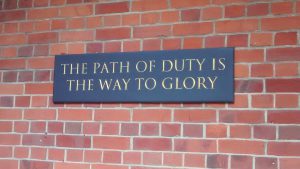Lesson powerpoint here
- What are my duties and where do they come from?
- Give pupils this quote from Ode on the Death of the Duke of Wellington by Tennyson (where the Path of Duty plaque comes from):
Not once or twice in our rough island-story,
The path of duty was the way to glory:
He that walks it, only thirsting
For the right, and learns to deaden
Love of self, before his journey closes,
He shall find the stubborn thistle bursting
Into glossy purples, which outredden
All voluptuous garden-roses.
- Ask pupils to explain what they think Tennyson means about duty, and about Wellington.
- Ask pupils to write down examples of the different duties they think they have. They ought to categorise these into duties to family, peers, school/house, state/country. For some of them, religion might confer duties on them too.
- Ask pupils to identify what makes these duties, rather than guidelines or preferences: in other words why do they believe they have to do these things, rather than just wanting to do them?
- Duties and moral foundations.
- Play pupils the video clip about transplants.
- Which of the people in the clip are affected by a sense of duty? How do we know?
- How do Penny’s relatives feel about the situation; what emotions are they experiencing? What reasons are they giving for their decisions? Is there a conflict between their feelings and the reasons they are giving for what they have chosen to do?
- Remind pupils of the 6 moral foundations encountered in lesson 4. Which of these 6 foundations are the people in the clip motivated by?
- Learning to deaden love of self.
- Present pupils with the following situation: it is 10 years in the future. You are a few years into your career and you have developed a good working relationship with a senior colleague, who has made it clear that they will help you to achieve promotion, in a company that is very competitive. You want to be successful and you are thrilled at the prospect of being mentored up the ladder. However, it comes to your attention that this colleague is involved in activity which is dishonest and potentially illegal. It doesn’t threaten your own job security, or the financial position of the company, but if this doesn’t come to light, a small number of people (other than you and the senior colleague) will lose their jobs and their reputations.
- What are the duties in this situation and what are the conflicts between duties? What emotions could affect the decision? Which duty should take priority and why? How do we know it is the right duty?